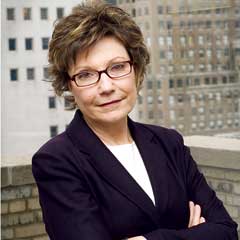Deborah Amos no longer recognizes Middle East she has known since 1983
By Michael Swan, The Catholic Register The biggest and best story of Deborah Amos’s 28-year career as a Middle East correspondent comes in the form of an eminently readable, fast-paced book about the Iraqi refugee crisis — Eclipse of the Sunnis: Power, Exile and Upheaval in the Middle East.
The biggest and best story of Deborah Amos’s 28-year career as a Middle East correspondent comes in the form of an eminently readable, fast-paced book about the Iraqi refugee crisis — Eclipse of the Sunnis: Power, Exile and Upheaval in the Middle East.
Amos spent five years among Iraq’s two million exiles, sipping tea with them in tiny, crumbling, empty apartments in the poor Geramana neighbourhood of Damascus, retracing their journeys from Baghdad by taxi, tracking them down after they resettled in the United States. Out of the whirlwind of “shock and awe” attacks on Baghdad in 2003, and the confusing rhetoric about weapons of mass destruction and regime change and democratizing the Middle East, Amos discovered that the key to understanding what was happening in Iraq was in the people streaming out of Iraq.
“If you don’t know about (the refugee story) there are some things you will miss about Iraq,” Amos told The Catholic Register. “What the refugee story is about is a sectarian cleavage in the country that is still there.”
As Christians and other minorities are forced out of the country, and the three largest groups (Shia, Sunni and Kurd) cleanse their urban neighbourhoods and rural districts to create ethnically and religiously exclusive cantons, a new Iraq is being created.
“You’re looking at a country that is shedding its diversity,” said the veteran ABC and National Public Radio reporter. “That is a dangerous thing to do, because Iraq is not an island.”
In the days of the Ottoman Empire and even before, Iraq was the frontier between the Arab and Persian worlds — a natural haven for Jews, Christians, Sabian Mandaeans, Turkmen, Yazidis and more. It was also a place where Sunni and Shia Muslims didn’t need to assert exclusive control over the affairs of government.
{sa 1586486497}Now that Saddam Hussein is gone and the mash-up of secular ideologies that was the Baath Party is banned, sectarian politics and sectarian violence are the handiest levers of power. Every time those levers are pulled it generates another wave of refugees.
Iraq’s refugees aren’t just about Iraq, according to Amos.
“This is a region that has been defined by a refugee crisis — the Palestinians,” she said. “It’s been unstable for years because of that population. You add another one on top of that and you’re asking for trouble.”
It isn’t just that a huge number of people growing poorer and more desperate in the surrounding countries are a potential powder keg of social injustice in a region full of resentments and oppression. It’s also how the new Iraq is defining sectarian politics that could blow up into another regional crisis, according to Amos.
Saudi Arabia, Jordan, the Palestinian Territories, Egypt and Lebanon — countries with Sunni majorities — are watching closely to see how the newly empowered Shia majority in Iraq is going to work with (or not) their Sunni minority. If it goes wrong it matters throughout the region.
“I’ve been in the Middle East since 1982. I just don’t know it like this,” said Amos.
The Christians, less than three per cent of the Iraqi population but as much as 15 per cent of the refugee population, aren’t just collateral victims sideswiped by a Muslim power struggle. In the book, Amos makes it clear they were the people who made Iraq a sophisticated, adaptable society and an interesting exception to most of the Middle East.
By taking Christian refugees out of the region to Canada, the United States and Europe are we aiding and abetting ethnic and sectarian cleansing?
“Yes, absolutely,” said Amos.
But we can’t hold people against their will, their lives on hold in the slums of Damascus and Beirut, just because we think it would be a shame if no Christians are left in the region.
“What a moral hazard that is,” said Amos.
“Killed if you stay, destroying the community if you leave. Yes it is abetting sectarian cleansing. But I’m sure if I was a family living in Damascus I would want to go (to the West).”
The biggest story of Amos’s journalistic career isn’t over now that the book is out. Iraq’s future and the region’s future still hang in the balance. There is no neat and one-paragraph explanation that will make it all understandable. But the story isn’t just regional politics. It’s a story lived by families, communities and individuals. Amos wanted her readers to meet the people who are in the middle of the story — the refugees.
“I wanted you to understand that these are people just like you,” she said. “And what would you do?”
Please support The Catholic Register
Unlike many media companies, The Catholic Register has never charged readers for access to the news and information on our website. We want to keep our award-winning journalism as widely available as possible. But we need your help.
For more than 125 years, The Register has been a trusted source of faith-based journalism. By making even a small donation you help ensure our future as an important voice in the Catholic Church. If you support the mission of Catholic journalism, please donate today. Thank you.
DONATE
